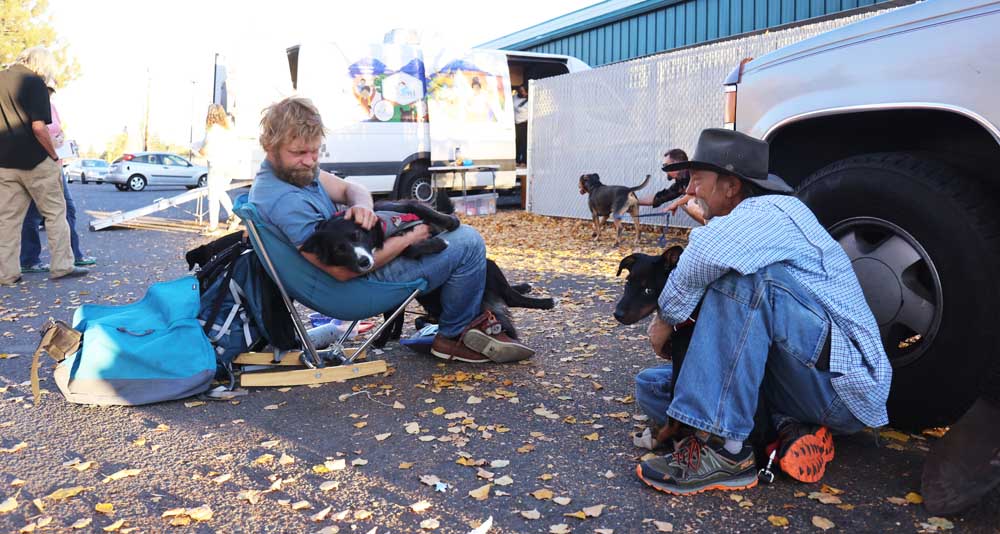Central Oregon homeless need dogs, advocate say. Taking care of them is the hard part.
Published 5:40 am Friday, October 27, 2023

- Cody Lonien, left, and his dogs, Bella and Roo visit with Michael Kimbrough and his dog Hank during the Companion Animal Medical Project event at the Lighthouse Navigation Center in Bend on Oct. 19.
Life after a 66-month stint in prison has been a struggle for Jesse James, who counts himself among those who experience homelessness in Central Oregon.
But his dog, a protective one-year-old pitbull named Ziggy, has helped him feel less alone.
Ziggy pulls James across Bend on his skateboard. Every day, James wakes up, feeds him and takes him to the gym. The dog gives James a sense of purpose, a routine, something to look forward to.
“I’m sober today because of him,” said James, a 43-year-old aspiring tattoo artist.
Dogs are essential companion animals for people experiencing homelessness, say local advocates and residents of homeless communities across Central Oregon. They provide comfort to people who live alone in tents and trailers. They give purpose to people who are fighting to acquire basic necessities: work, food, shelter and more.
But taking care of these animals comes with inherent challenges for people experiencing homelessness. Some struggle to afford food or veterinary care. Many shelters won’t accept people with dogs or will put their pets through a rigorous vetting process. The goal is to ensure they’re healthy and won’t bite someone or another dog.
“He’s what keeps me sane out here, keeps me cool, calms me down,” said Jacob Lee, 30, who has experienced homelessness and struggles to find work because his dog, Panda, whines when he’s not around.
A series of news stories involving homeless dog owners and debate over rules over people experiencing homelessness has quickly raised questions among some residents around the condition of dogs in homeless encampments and whether these animals are safe.
A brutal dog mauling at the Juniper Ridge homeless encampment in July ended in the death of a Bend man, authorities say. A Bend woman who owns the dogs has been charged with manslaughter. Prosecutors claim her dogs have bitten others.
A 60-year-old man living in a trailer at a homeless encampment was arrested in August after allegedly directing his pit bull to attack a city employee who was enforcing Bend’s camping code.
Police say the man was not being removed but was upset that officials were removing garbage. The 21-year-old worker suffered a minor bite to his hand.
Still, advocates argue that many of these dogs are well cared for and are no more prone to attacking people than dogs owned by people with homes.
“They’re not all vicious,” said JW Terry, the executive director for Central Oregon Veterans Outreach, an organization that supports veterans who experience homelessness. “They’re protective. There’s a lot of care.”
Bend Fire & Rescue paramedics have responded to nine incidents involving dog bites in 2023. Only one was at a homeless camp, said Drew Norris, deputy chief of emergency medicine for Bend Fire & Rescue
Of the fatal dog mauling, Norris said, “That one was way outside the norm.”
Bend Police couldn’t provide the total number of animal complaints involving dogs owned by people who are homeless. That’s because the department doesn’t categorize its calls by whether a person is housed or not.
But police say that, anecdotally, officers don’t respond to more dog bites in homeless encampments than in other neighborhoods.
To help homeless pet owners, Deschutes County has sought grant funding for groups performing sterilizations and has invested in shelter projects to provide space for people with pets, said Commissioner Phil Chang.
Johannah Johnson-Weinberg is the founder and executive director of Companion Animal Medical Project, a Bend-based nonprofit that supports homeless pet owners by providing free veterinary care and supplies.
In the past three years, the project has sterilized roughly 300 dogs and vaccinated about 1,000. Johnson-Weinberg said some of the animals have been in rough shape: infections, abscesses, cancerous dental issues, injuries from a car accident, the rare dog needing an amputation.
However, she said that it’s a misconception that people who are homeless are poor pet owners. “In all honesty, the animals that show up to our clinics, considering their circumstances, are in pretty good shape,” she said. “Much like people who live in four walls, people who live outdoors will do anything to make sure their dogs are cared for.”
Johnson-Weinberg said the bigger challenge for homeless pet owners is finding help for themselves — housing, drug treatment and other basic necessities — while simultaneously caring for their dog and seeking out affordable veterinary care and supplies. She said that care is only becoming more difficult as people are pushed further and further from residential areas.
On Thursday, dozens of people gathered in the parking lot of the Lighthouse Navigation Center, a shelter on 2nd Street in Bend, for a free clinic led by the project. Workers vaccinated dogs, handed out toys and food, performed checkups and gave advice to owners of sick and injured pets.
Kim Scott, a 60-year-old woman who recently found housing, was there with her nine-year-old chihuahua mix, Toby. Scott has struggled with her mental health while living homeless, but Toby has always been there.
“He doesn’t ever leave and loves unconditionally,” she said.
But Toby is getting older and more lethargic, she said. Sometimes he won’t eat. The workers looked at Toby and said there appeared to be a tumor on the dog’s backside. But Scott can’t afford to get it removed.
Paying for his veterinary bills, she fears, would cause her once again to be homeless.






